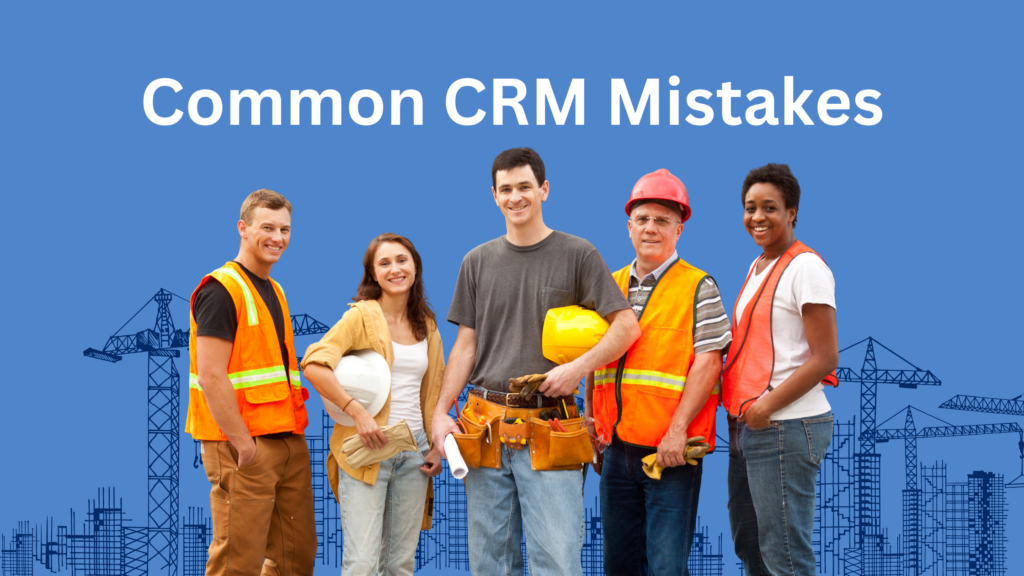
Introduction
In today’s rapidly evolving construction industry, managing multiple projects, teams, and client relationships has outgrown the capabilities of spreadsheets and manual systems. By 2025, Construction CRM software will transition from being a luxury to a necessity for staying competitive. A CRM revolutionizes operations by centralizing data, streamlining processes, and improving communication, offering a transformative edge to businesses aiming for growth and efficiency.
At bldon.com, we specialize in cutting-edge Construction CRM solutions designed to simplify project management, strengthen client relationships, and boost profitability. But, why is it necessary now, and what can a Construction CRM do to ensure the success of your business in the coming years? So let’s dive a little deeper into what the benefits of it are, what it can do, and what the future could be.
- Introduction
- What is a Construction CRM?
- Why Is a Construction CRM Essential in 2025?
- The Key Features of a Construction CRM
- The Role of AI and Automation in Construction CRMs
- Benefits of Adopting a Construction CRM
- Overcoming Challenges in CRM Implementation
- The Future of Construction CRMs
- Conclusion
- FAQs About Construction CRMs
What is a Construction CRM?
Construction CRM software is a customized type of software designed to help manage the diverse challenges that are inherent to the construction domain. Unlike generic CRMs, construction-focused CRMs come loaded with tailored tools to manage bids, lead tracking, project coordination, and ongoing client relationship building.
Key Functions of a Construction CRM:
- Bringing customer and project data under control
- Lead Tracking and follow-up automation
- Ensure communication with teams and their clients.
- It also allows users to generate detailed project and financial reports.
Many platforms (like ours) consider the efficient use of these functions. Therefore, you can seamlessly pair them with other necessary tools to increase efficiency.
Why Is a Construction CRM Essential in 2025?
1. Simplifying Project and Client Management
Construction projects are multi-stakeholder projects and have defined timelines and deliverables. All of these steps can, however, be tedious, and sometimes errors can occur which will delay the project and make your client unhappy. Construction CRMs bring project and client data together into one, simple place and make visibility, track, and communicate to keep things organized, staying on schedule, and resources assigned.
Pro Tip: CRM software allows you to track projects effortlessly, avoid communication challenges, and ensure successful project execution every time.
2. Enhancing Collaboration Across Teams
Poor communication on site can lead to costly mistakes, as staff, contractors, and office teams all need to know what is going on at any one time. Construction CRMs are a single point of visibility where everyone can update, and share documents and schedules in one place to stay aligned.
3. Improving Customer Retention
It is very important to make the client happy, which will result in repeat business and also referrals. Construction CRMs allow businesses to track client preferences, follow up with past interactions, and anticipate their needs.
If you want to impress and retain clients, then go for a CRM with features like contacts, accounts, leads, and referral storage. This will help you keep your clients informed and happy throughout the project.
4. Maximizing Sales and Profitability
CRM automates lead tracking and bid management and keeps you from missing an opportunity. Analytics tools allow businesses to see trends, fine-tune their bidding strategies, and concentrate on high-value opportunities.
5. Future-Proofing Operations
From sustainability, automation, and remote work, industry trends are already in place shaping the future of construction in 2025. To prepare businesses to adapt to these shifts, cloud-based CRM with AI-driven analytics is your best tool.
The Key Features of a Construction CRM
1. Customizable Dashboards
Create dashboards that highlight particular metrics like schedules, financial projections, or lead conversion rates. This helps to make sure that every one of your team members sees the best things that are important to them.
2. Bid and Proposal Management
Efficiently bidding, generating professional proposals, and providing support through the bid pipeline. When integrated tracking is available, businesses are able to manage their efforts better and raise their win rates.
Using CRM software, businesses can manage bids intuitively to get more projects for less work.
3. AI-Powered Analytics
AI-powered CRMs enhance your efficiency by automating repetitive tasks, reducing errors, and saving time on activities like scheduling follow-ups or sending reminders. They improve forecasting by analyzing your historical data to predict trends. Additionally, AI prioritizes high-conversion leads, helping your sales teams focus on opportunities most likely to succeed.
4. Mobile Access
In an industry where on-site management is key, mobile CRM puts Management in the palm of their hands and allows access to schedules, client details, and updates at their fingertips.
5. Seamless Integrations
A great Construction CRM lets you link up with tools like accounting software, project management tools, scheduling systems, and more. It cuts down on manual data entry and also streamlines the process.
A Construction CRM works hand in hand with what you already have for minimal time and effort.
The Role of AI and Automation in Construction CRMs
1. Streamlining Repetitive Tasks
Automation means fewer human errors and less time wasted to schedule follow-ups or generate invoices. For example, businesses can send project milestones or overdue payment reminders to themselves automatically.
2. Improve Forecasting
Using AI, power tools read and analyze historical data to predict future trends — for instance, which projects will exceed budget, or where bottlenecks are likely for project duration and cost. It aids in planning the resources through businesses.
3. Increasing Lead Conversion Rates
CRMs with AI can evaluate your leads to determine which ones are most likely to convert. This enables your sales teams to concentrate their efforts on the most promising leads.
Benefits of Adopting a Construction CRM
For Small Businesses:
1. Better Lead Tracking and Conversion Rates.
A CRM allows small businesses to handle their leads efficiently, capturing every contact from the first touchpoint right up until closing the deal. With features like lead scoring and automated follow-up systems, companies can concentrate on those high-quality prospects. This significantly increases conversion rates without overstretching resources.
2. Efficient Resource Management.
Small businesses often work with limited resources and hence it’s very important that they manage them efficiently also. A Construction CRM can help you deploy labor, equipment, and materials in the best possible proportions. This cuts waste and ensures every single project goes ahead on time and within budget.
3. Enhanced Reputation for Timely Delivery.
Streamlining workflows and automating scheduling, a CRM helps small businesses get their projects finished when they should. This consistently on-time delivery of work builds client trust and reputation. Customers will refer others to you if things go well, even giving you new work themselves based solely upon a recommendation from someone who used your services before.
For Large Enterprises:
1. End-to-End Analytics for Informed Decisions.
In big corporations, data-driven decisions are the order of the day. A Construction CRM gives you total analytics–helping managers and their teams understand your project’s performance, shape budgets, and manage risks better.
2. Scalable Project Management Solutions.
As enterprises expand, they need systems that scale effortlessly. Construction CRMs can scale to incorporate many projects, many different teams, and operations that span different countries–so this software grows with the company.
3. Integration with Advanced Tools.
For large enterprises, CRMs naturally integrate with advanced technologies like Building Information Modeling (BIM) software. Other possible integrations may include ERP systems and AI-driven analytics, making operations more coherent and smoother.
Overcoming Challenges in CRM Implementation
Adopting a Construction CRM can come with challenges, including:
- High Initial Costs: Start small, grow, choosing scalable plans.
- Employee Training: Organize workshops so that your team adapts fast.
- System Integration: Pick CRMs that fit well with your current tools.
The Future of Construction CRMs
1. Greater AI Integration
More intuitive CRMs can be expected to automate decision-making such as which project timing is best or what clients might next follow up with.
2. Enhanced Visualization Tools
In a construction context, Augmented Reality helps your site workers see things in 3D, overlaid on what is physically there on site. With this kind of data place them right into the picture and identify conflicts intimately. It’s not just an accuracy mechanism for project engineering but also brings new ways of working to the table. Also, such AR tools are valuable in training on-site staff.
3. Increased Emphasis on Cybersecurity
As data breaches are now more common, future CRMs might focus on encryption and data protection rules compliance.
Conclusion
The construction industry today is fast-paced, technology-driven, and focused on customer satisfaction. Therefore, adopting a Construction CRM will help your businesses stay ahead by addressing these evolving demands with ease.
A CRM centralizes your data and simplifies repetitive tasks through automation. It not only helps with estimation and bid tracking but also delivers predictive insights to make informed decisions. These capabilities will empower your construction firms to execute projects efficiently while building strong, lasting client relationships.
Invest in a good construction CRM today! Schedule a Demo with Bldon.com. Thus, you’ll future-proof your operations and future-proof the success of your operation.
FAQs About Construction CRMs
1. What makes a Construction CRM different from a generic CRM?
Most generic CRMs only have generic features like email marketing, customer relationship management, etc. Meanwhile, a construction CRM has industry-specific features such as bid tracking, project management, and client coordination tools.
2. How can I choose the best Construction CRM for my business?
It should have utility such as customization of the dashboards, AI-powered analytics, integration ability, and mobile capability. Thinking of going for a trustworthy option? Try out bldon.com as a trusted solution.
3. Is a Construction CRM suitable for small businesses?
Absolutely. CRMs are excellent for small businesses as they help speed up the process of running the business, improve the way of communicating with the clients, and make resource usage more efficient. bldon.com has scalable solutions for any business size.
4. How much does a Construction CRM typically cost?
Some CRMs come with many features and mandate payments for all the features even when you are not using them. Pick a CRM where you can pay for the features that you need, so you don’t waste your money. Platforms like bldon.com have flexible pricing plans to consider your needs.
5. What is the implementation process like for a Construction CRM?
Implementation involves data migration, team training, and system integration. Partnering with a provider like bldon.com ensures a smooth and hassle-free setup.

